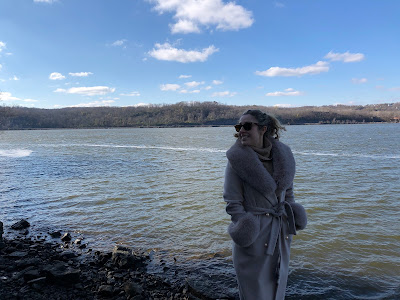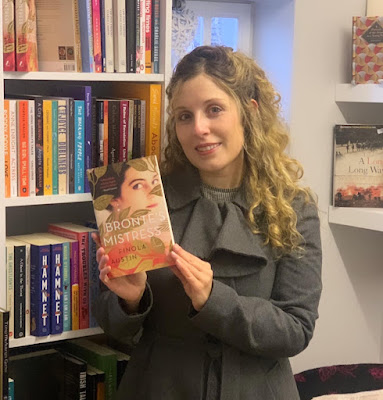As the author of a novel inspired by the scandalous lives of the Bronte siblings (Bronte’s Mistress), I’ve fielded a lot of questions recently about Emily, the 2022 biopic about the most mysterious Bronte sister, which only came to theaters in the US last month. Have I seen it? Do I like it? Is it accurate??
In this blog post I’m finally breaking down my response to the movie into two sections—highlights and lowlights. I’d absolutely love to hear your opinions too!
Highlights
Location/Setting: The movie was shot on location, largely in the Brontes’ hometown of Haworth. It was a thrill for me to see the Bronte siblings on film in the parsonage, where they lived, and on the moors where they would have roamed. Emily is beautifully filmed, and the movie would be worth watching for the Yorkshire landscape alone.
Acting: The actors, especially Emma Mackey who played the title role, were stellar (although clearly cast for their talent rather than for any family resemblance between the siblings!).
Boosting Bronte-Mania: Critics and audiences alike seem to have really enjoyed the film, which is great news for Bronte fans (and Bronte-related authors like me). I hope it encourages even more readers to pick up Wuthering Heights and the other Bronte novels.
Lowlights
Romance: I was saddened, although not surprised, that much of the movie was given over to a fictional romance between Emily Bronte and the curate, William Weightman. I understand the film industry’s desire to add bodice ripping to every period drama. However, there was enough scandal in the Brontes’ lives without making more up and I felt the romantic focus took away from who I believe Emily Bronte really was—reclusive, introverted, and not writing from personal experience when she penned the violent passion of Wuthering Heights.
Publication History: The end of the movie was truly horrifying to me, and not because of the Bronte siblings’ speedy deaths. The screenwriters took a huge liberty in changing the publication history of Wuthering Heights and Jane Eyre and suggesting that Charlotte only penned her famous novel in response to Emily’s success.
Charlotte and Anne: Speaking of which, both Charlotte and Anne came out of the Emily biopic particularly badly. While Charlotte’s genius was chalked up to mere sibling rivalry, Anne’s writing aspirations were barely mentioned. I appreciate that this was a movie about Emily, but do we really need to keep putting Bronte sisters down to raise others up?
Sibling Relationships: Branwell, the Bronte brother, also gets a lot of screen time. What was most puzzling to me here was that the movie suggested there was most sympathy and kinship between him and Emily, presenting them as the “fun” ones, compared to an uptight Charlotte and generally useless Anne. In fact, Branwell and Charlotte were incredibly close, as were Emily and Anne—that’s why these were the pairings in which they wrote their juvenilia. There were some early references to the siblings’ childhood make-believe worlds, but this aspect of their relationships was severely underdeveloped in favor of making Emily and Branwell our bad girl/boy rebels.
Lydia Robinson: Finally, as the author of a novel all about Branwell’s affair with Lydia Robinson, his employer’s wife, I was of course intrigued to see how the movie would cover this episode. Sadly, nothing that happened at Thorp Green Hall, or the impact this had on the Bronte family, made it into the movie. Instead, there was just a brief and confusing scene featuring Branwell flirting with a married woman closer to home. Hollywood scouts, if you’re reading this, there was a real Bronte love affair, and one with the scope for multiple sex scenes—you just need to read Bronte’s Mistress. ;)
So, there you have it—this has been my take on Emily. The film is beautiful and well-acted and few of my gripes will matter if you don’t know much about the Brontes. But if you do, you might find yourself screaming at the screen like me…
Bronte fans, do you agree or disagree? I’d love for you to let me know—here, on Facebook, on Instagram, or by tweeting @SVictorianist.



























